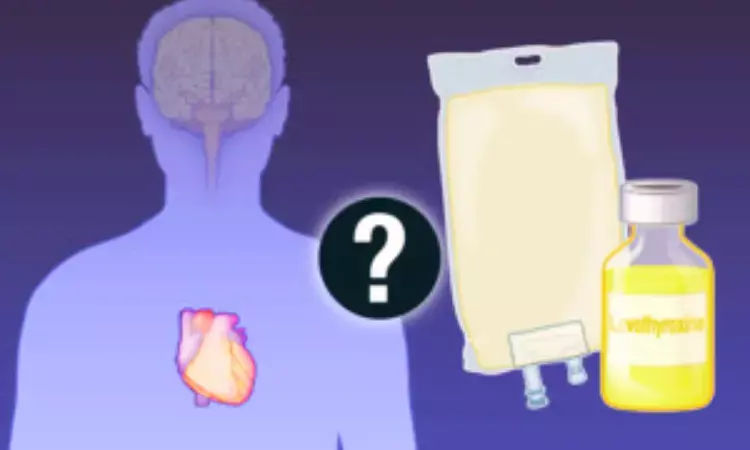- Home
- Medical news & Guidelines
- Anesthesiology
- Cardiology and CTVS
- Critical Care
- Dentistry
- Dermatology
- Diabetes and Endocrinology
- ENT
- Gastroenterology
- Medicine
- Nephrology
- Neurology
- Obstretics-Gynaecology
- Oncology
- Ophthalmology
- Orthopaedics
- Pediatrics-Neonatology
- Psychiatry
- Pulmonology
- Radiology
- Surgery
- Urology
- Laboratory Medicine
- Diet
- Nursing
- Paramedical
- Physiotherapy
- Health news
- Fact Check
- Bone Health Fact Check
- Brain Health Fact Check
- Cancer Related Fact Check
- Child Care Fact Check
- Dental and oral health fact check
- Diabetes and metabolic health fact check
- Diet and Nutrition Fact Check
- Eye and ENT Care Fact Check
- Fitness fact check
- Gut health fact check
- Heart health fact check
- Kidney health fact check
- Medical education fact check
- Men's health fact check
- Respiratory fact check
- Skin and hair care fact check
- Vaccine and Immunization fact check
- Women's health fact check
- AYUSH
- State News
- Andaman and Nicobar Islands
- Andhra Pradesh
- Arunachal Pradesh
- Assam
- Bihar
- Chandigarh
- Chattisgarh
- Dadra and Nagar Haveli
- Daman and Diu
- Delhi
- Goa
- Gujarat
- Haryana
- Himachal Pradesh
- Jammu & Kashmir
- Jharkhand
- Karnataka
- Kerala
- Ladakh
- Lakshadweep
- Madhya Pradesh
- Maharashtra
- Manipur
- Meghalaya
- Mizoram
- Nagaland
- Odisha
- Puducherry
- Punjab
- Rajasthan
- Sikkim
- Tamil Nadu
- Telangana
- Tripura
- Uttar Pradesh
- Uttrakhand
- West Bengal
- Medical Education
- Industry
IV levothyroxine infusion of no significant benefit in improving donor heart utilization from brain-dead donors: NEJM

USA: Intravenous (IV) levothyroxine infusion versus saline infusion failed to increase the rate of hearts transplanted from hemodynamically unstable brain-dead organ donors being considered for heart donation, findings from a clinical trial have shown. The findings were published online in the New England Journal of Medicine on November 30, 2023.
In the multicenter, randomized, controlled trial involving hemodynamically unstable potential heart donors, the researchers found no significant benefit of IV levothyroxine treatment as compared to normal saline in improving donor heart utilization concerning the hemodynamic stability, number of hearts transplanted, or donor cardiac function.
Myocardial dysfunction and hemodynamic instability are major factors that prevent heart transplantation from organ donors after brain death. IV levothyroxine is used widely in donor care based on observational data indicating that more organs may be transplanted from donors who receive hormonal supplementation.
The few randomized trials that have assessed the administration of thyroid hormones have focused on intermediate outcomes as donor hemodynamics and were underpowered to evaluate organ utilization. Consensus guidelines recommend thyroid hormone in hemodynamically unstable or heart-eligible donors, despite little high-quality evidence. The treatment, however, has been tied to risks to the donor, in addition, some studies have shown higher early allograft failure rates.
Rajat Dhar, Department of Neurology, Washington University School of Medicine, St. Louis, MO, and colleagues designed the present clinical trial to evaluate the hypothesis that IV levothyroxine would raise the rate of hearts transplanted from hemodynamically unstable brain-dead organ donors considered for heart donation.
The trial involved 15 organ-procurement organizations in the United States. Hemodynamically unstable potential heart donors were randomly assigned within 24 hours after death declaration according to the neurologic criteria to open-label infusion of IV levothyroxine (30 μg per hour for a minimum of 12 hours) or saline placebo.
The study's primary outcome was transplantation of the donor's heart; graft survival at 30 days after transplantation was a prespecified recipient safety outcome. Secondary outcomes included donor ejection fraction, weaning from vasopressor therapy, and number of transplanted organs per donor.
852 brain-dead donors underwent randomization, out of which 838 were included in the primary analysis: 419 in the levothyroxine group and 419 in the saline group.
Based on the trial, the researchers reported the following findings:
· Hearts were transplanted from 54.9% of donors in the levothyroxine group and 53.2% in the saline group (adjusted risk ratio, 1.01).
· Graft survival at 30 days occurred in 97.4% of hearts transplanted from donors assigned to receive levothyroxine and 95.5% of hearts transplanted from donors assigned to receive saline.
· There were no substantial between-group differences in ejection fraction on echocardiography, weaning from vasopressor therapy, or organs transplanted per donor, but more cases of severe hypertension and tachycardia occurred in the levothyroxine group than in the saline group.
"Intravenous levothyroxine infusion did not result in significantly more hearts being transplanted than saline infusion in hemodynamically unstable brain-dead potential heart donors," the researchers concluded.
Reference:
Dhar, R., et al. (2023) Intravenous levothyroxine for unstable brain-dead heart donors. New England Journal of Medicine. doi.org/10.1056/NEJMoa2305969.
Dr Kamal Kant Kohli-MBBS, DTCD- a chest specialist with more than 30 years of practice and a flair for writing clinical articles, Dr Kamal Kant Kohli joined Medical Dialogues as a Chief Editor of Medical News. Besides writing articles, as an editor, he proofreads and verifies all the medical content published on Medical Dialogues including those coming from journals, studies,medical conferences,guidelines etc. Email: drkohli@medicaldialogues.in. Contact no. 011-43720751


